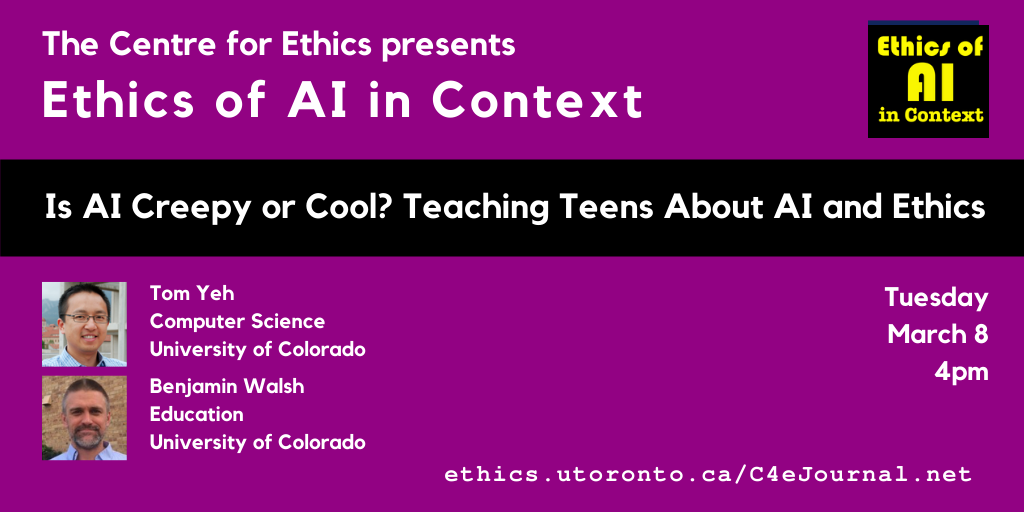
► To stay informed about other upcoming events at the Centre for Ethics, opportunities, and more, please sign up for our newsletter.
Teens have different attitudes toward AI. Some are excited by AI’s promises to change their future. Some are afraid of AI’s problems. Some are indifferent. There is a consensus among educators that AI is a “must-teach” topic for teens. But how? In this talk, we will share our experiences and lessons learned from the Imagine AI project, funded by the National Science Foundation and advised by the Center for Ethics (C4E). Unlike other efforts focusing on AI technologies, Imagine AI takes a unique approach by focusing on AI ethics. Since 2019, we have partnered with more than a dozen teachers to teach hundreds of students in different classrooms and schools about AI ethics. We tried a variety of pedagogies and tested a range of AI ethics topics to understand their relative effectiveness to educate and abilities to engage. We found promising opportunities, such as short stories, as well as tensions. Our short stories are original, centering on young protagonists, and contextualizing ethical dilemmas in scenarios relatable to teens. We will share what stories are more engaging than the others, how teachers are using the stories in classrooms, and how students are responding to the stories.
Moreover, we will discuss the tensions we identified. For students, there is a tension of balance: how can we teach AI ethics without inducing a chilling effect? For teachers, there is a tension of authority: which teacher, a social study teacher well-versed in social issues, a science teacher skilled in modern technology, or an English literacy teacher experienced in discussing dilemmas and critical thinking, would be the most authoritative to teach about AI ethics? Another tension is urgency: while teachers agree AI ethics is an urgent topic because of AI’s far-reaching influence on teens’ future, they struggle to meet teens’ even more urgent and immediate needs such as social-emotional issues worsened by the pandemic, interruption of education, loss of housing, and even school shootings. Is now really a good time to talk about AI ethics? But if not now, when? We will discuss the implications of these tensions and potential solutions. We will conclude with a call for action for experts on AI and ethics to partner with educators to help our future generations “imagine AI.”
► please register here
This is an online event, available on the Centre for Ethics YouTube Channel, on Tuesday, March 8. Channel subscribers will receive a notification at the start. (For other events in the series, and to subscribe, visit YouTube.com/c/CentreforEthics.)

Tom Yeh
Computer Science
University of Colorado

Benjamin Walsh
Education
University of Colorado
Tue, Mar 8, 2022
04:00 PM - 05:30 PM
Centre for Ethics, University of Toronto
200 Larkin
